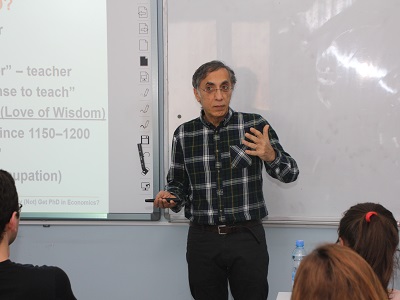PhD Studies - Who Is It for?
- Details

“You need to think carefully before you jump into this deep sea,” said Professor Daniel Levy at the very beginning of a presentation entitled “PhD Studies - Who Is It for?”. While this statement sounded frightening to those who were planning to pursue a PhD or other further studies, it appeared to be more bemusing for others who were not considering a career in academia.
Based on his personal experience, Dr. Levy explained that substantial difficulties come with academic life: a PhD is not a continuation of an MA, and it constitutes an “unbelievable amount of commitment”. It requires “focus, and lots of patience, time and energy”. Dr Levy recalled that during his studies, he took most of his meals sitting in front of a computer or with his nose buried in a book.
ISET Hosts Seminar-Wrokshop on Georgian Anomaly in Rural-Urban Transition
- Details

On January 29, ISET was pleased to host Prof. Michael Beenstock for a seminar-workshop. Prof. Beenstock is the author of ten books on topics including time series and spatial econometrics, macroeconomics, the global economy and economic development, as well as writing more than 100 refereed journal articles. He presented the preliminary findings of a research project entitled “The Puzzle of Economic Development without Rural-Urban Transition in Georgia.” The project was undertaken by the Shota Rustaveli National Science Foundation and an ISET research team.
“Manchester is known for two things: 1) Manchester United and Manchester City, 2) I was born in Manchester,” said Prof. Beenstock at the very beginning of a presentation. The third point fame for the city, which is more important for Economic Science, is Victoria University of Manchester. Here, Arthur Lewis wrote his seminal work in Development and Growth Economics for which he was awarded the Nobel Memorial Prize in Economics in 1979. Lewis provided a structural theory of economic development which explained the correlation between urbanization and development in the past, and which would also predict it in the future. The Lewis and Harris-Todaro (Harris and Todaro 1970) models have become canons of textbooks on development economics, and rural-urban transition is now regarded as an inevitable and ubiquitous consequence of economic development.










